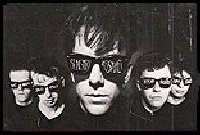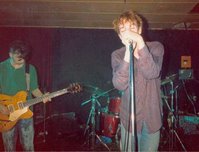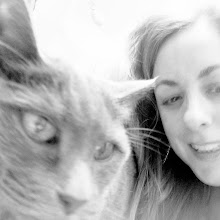 That Petrol Emotion, Babble, Polydor/Universal
That Petrol Emotion, Babble, Polydor/UniversalIt seems barely credible that a group responsible for so much brilliant music remained the preserve of a committed few, but that's how it was. Following the Petrols became akin to membership of an evangelical cult. You would turn up at services, be inspired, go away and spread the word, then sit back, waiting for the inexorable conversion of millions to our way of thinking. If it was frustrating for us true believers, goodness knows how it made the band feel to see great work consigned to the margins of popular consciousness. I was saddened but not surprised when they called it a day in 1994.
-- Keith Cameron (2000)
***** ***** ***** *****
Rising from the ashes of John Peel favorites the Undertones (1975-1983), That Petrol Emotion consisted of four funny-haired lads from Derry, Northern Ireland and one funny-haired Yank. The latter, Steve Mack, hailed from Seattle, where he currently resides. The Petrols sounded nothing like the Undertones, of which Sean and Damian O'Neill were founding members--and not just because Feargal Sharkey was no longer frontman. With Mack's assistance, Seán (guitar), Damian (bass), Reámann O'Gormáin (guitar), and Ciaran McLaughlin (drums) completely reinvented themselves. (In the CD booklet, Mack is credited with "stuff.")
Released by UK independent Demon, Manic Pop Thrill (1986) was the quintet's first album. I ended up picking it up after Babble, however, as their sophomore effort was a lot easier to track down. I was living in Anchorage in 1987 and imports could be pretty tough to come by. (Once I moved to Seattle the following year, that would change.) Produced by Roli Mosimann, drummer for the Swans, Babble manages to be diverse and cohesive at the same time. It's a mélange of pop, punk, funk, and hip-hop. Only "Creeping to the Cross" approaches dirgey Swans territory.
That Petrol Emotion - "Big Decision"
This 2001 CD remaster includes the original 11 tracks, plus five bonus selections (three alternate takes and two B-sides), along with liner notes by Keith Cameron. The slinky, stuttering "Big Decision," which received much love from MTV, remains my favorite. They describe it as follows: "Oil, spreagadh, saorú." Alas, I don't speak Irish, so I have no idea what that means, but their other comments are pretty revealing. Here's a sampling.
***** ***** ***** *****
Swamp: "Never tell an Englishman what you think," a friend once told me, "there are more and less subtle forms of venting your frustration."
In the Playpen: The rich behave like gangsters, the poor like prostitutes.
Inside: A plague upon Thatcherism.
Chester Burnett: I've got a black friend who used to live in Kilburn. She says that a lot of the Irish people there were just as racist as anywhere she's ever lived. It's pathetic, really. You live in a country where you've been oppressed all throughout history. Then, once you emigrate, you start treating other people sometimes less fortunate than you with the same inhumanity.
Creeping to the Cross: Putting a down payment on Heaven
and to Hell with everyone else.
***** ***** ***** *****
Cameron adds, "While Morrisey sang 'Hang the DJ,' That Petrol
Emotion had no such reservations, copping hip-hop beats and
incorporating Brother D & the Collective Effort's 'How We Gonna
Make the Black Nation Rise' into 'Big Decision.' Live, it became
'How We Gonna Make the Irish Nation Rise,' just in case anyone was still wondering what 'That Petrol Emotion' was all about."
 Yes, that's right, the Petrols were a political band. They were also the product of a specific time and place. Sinead O'Connor dealt with some of the same issues on her 1980s recordings, like I Do Not Want What I Haven't Got (1989). "Black Boys on Mopeds," for instance, could be the companion piece to "Chester Burnett." Yet, despite similar concerns, I don't recall that the Petrols were often compared to other Irish acts, like U2 and the Pogues. Granted, there's a difference between Northern Ireland and the Republic. Plus, TPE, like the Pogues, were actually based in London. But they weren't often compared to politically-minded Brits, like Billy Bragg, either. Ultimately, they carved their own niche. It may have been a small one, but it was theirs alone.
Yes, that's right, the Petrols were a political band. They were also the product of a specific time and place. Sinead O'Connor dealt with some of the same issues on her 1980s recordings, like I Do Not Want What I Haven't Got (1989). "Black Boys on Mopeds," for instance, could be the companion piece to "Chester Burnett." Yet, despite similar concerns, I don't recall that the Petrols were often compared to other Irish acts, like U2 and the Pogues. Granted, there's a difference between Northern Ireland and the Republic. Plus, TPE, like the Pogues, were actually based in London. But they weren't often compared to politically-minded Brits, like Billy Bragg, either. Ultimately, they carved their own niche. It may have been a small one, but it was theirs alone.That said, Babble can easily be enjoyed on strictly musical terms. There's no hectoring going on here. The more I listen, the more I hear. Only "For What It's Worth" flirts with psychedelia, but the abundance of minor chords brings to mind Love and mid-period Damned, while Television lives on in the discordant interplay between O'Neill and O'Gormáin. I also hear New Order and Love & Rockets in McLaughlin's rolling beats. There's nothing gothic about TPE, but there's a post-goth spirit haunting this enterprise. It's the brightness of Mack's voice combined with the darkness of the music. No doom and gloom, but plenty of yin and yang.
That Petrol Emotion released three more records before packing it in. There's some good stuff on End of the Millenium Psychosis Blues (1988), but I'm less familiar with Chemicrazy (1990) and Fireproof (1993). Manic Pop Thrill and Babble, however, are essential. In my collection, they fit between the Temptations' Psychedelic Shack/Puzzle People and the self-titled debut from Them, which couldn't be more perfect. For eight years, That Petrol Emotion inhabited a musical neighborhood all their own, located somewhere between Detroit and Derry. A troubled region, perhaps, but one permeated by passion and intelligence.
Endnote: Images from That Petrol Emotion, video from YouTube. Part six in a series about the influence of black culture on Irish music. For more, see Part One, "Green Eyed Soul" (Them), and Part Three, "Shamrocks and Shenanigans" (House of Pain).

1 comment:
hi Kathy thanks for the piece on the petrols it always makes me happy when people remember us, you should check out Chemicrazy, Fireproof and Final Flame as i would say hand on heart that these are the three best records we made, this latter part of our career always gets glossed over when really we kept going from strength to strength. Take care and thanks again Reamann O Gormain.
Post a Comment